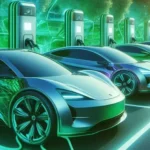Evs Key To India’s Transition To Low Carbon Economy: DPIIT Secy

The government has rolled out PLI schemes for Advanced Chemistry Cell (ACC) battery storage with an outlay of Rs 18,100 crore and Rs 26,058 crore PLI scheme for auto, auto-components, and drone industries
The vision to make India a developed nation by 2047 includes a major shift towards electric vehicles, supported by tax incentives, production-linked incentive schemes, and the mandatory provision of charging infrastructure, a top government official said.
Secretary in the Department for Promotion of Industry and Internal Trade (DPIIT) Rajesh Kumar Singh said that the development and adoption of Electric Vehicles (EVs) play a pivotal role in India’s transition to a low-carbon economy.
“The comprehensive vision for 2047 includes a substantial shift towards electric vehicles across various segments, supported by tax incentives, Production Linked Incentive (PLI) schemes, and the mandatory provision of charging infrastructure,” Singh told PTI.
He said that a shift in the modal share of freight from road to rail will be an effective lever to decarbonise the freight transport sector.
He added that the government’s authorisation of 100 percent Foreign Direct Investment (FDI) for renewable power projects underscores the nation’s dedication to sustainable development.
Viksit Bharat @ 2047 is the vision to make India a developed nation by 2047, the 100th year of independence.
The vision encompasses various aspects of development, including economic growth, social progress, environmental sustainability, and good governance.
Singh said that he discussed these things in a session on ‘Financing Industrial Ecosystems of the Future’ at the recently concluded World Economic Forum (WEF) meet at Davos.
“The agenda for the session was to discuss how public and private institutions can provide financing that will benefit the cluster partnership model in creating shared infrastructure and innovative decarbonisation projects,” he said.
He added that key reforms such as the PM Gati Shakti programme and the Unified Logistics Interface Platform were showcased in the meeting, highlighting India’s dedication to sustainable development and robust infrastructure growth.
The fast-growing EV market in India is catching the eye of global players. India’s electric vehicle market is expected to grow to 1 crore units in annual sales by 2030 and create five crore direct and indirect jobs, according to the Economic Survey 2022–23.
As per industry estimates, the total EV sales in India stood at around 10 lakh units in 2022. On the back of increasing EV demand, the Indian government is providing fiscal incentives to promote domestic manufacturing of these cars.
The government has rolled out PLI schemes for Advanced Chemistry Cell (ACC) battery storage with an outlay of Rs 18,100 crore and Rs 26,058 crore PLI scheme for auto, auto-components, and drone industries.
In India, Tata Motors is the leading player in passenger electric vehicles.
Describing his participation in the WEF as a “highly successful” one, the secretary said India has consistently fostered an environment of trust and confidence among investors and stakeholders.
“This impactful presence at the World Economic Forum 2024 solidifies India’s commitment to establishing itself as a reliable and influential player on the global stage,” he added.
(PTI)


















































































































































































































































































































































































































































































































































































































































































































































































































































